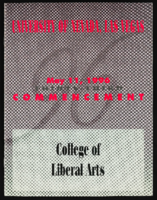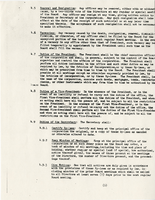Search the Special Collections and Archives Portal
Search Results
Ruth St. Denis Collection
Identifier
Abstract
The Ruth St. Denis Collection (1916-1986) contains materials relating to the St. Denis School of Dance in Los Angeles, California. Included are scrapbooks containing magazine cutouts from early 20th century performers and celebrities and programs featuring St. Denis or performances honoring her memory.
Archival Collection
Downtown Las Vegas Design Drawings
Identifier
Abstract
The Downtown Las Vegas Design Drawings (approximately 2011-2014) is comprised of seven design drawings created for select businesses located in downtown Las Vegas, Nevada. The drawings are colored on tissue and were created by BUNNYFiSH studio, an architectural firm located in downtown Las Vegas, Nevada. The collection includes three drawings for a porte-cochère at the D Las Vegas hotel; drawings for the exteriors of the Hydrant Club, Inspire, and HOP Downtown; and an interior drawing for Scullery.
Archival Collection
Ellen B. Jensen Papers
Identifier
Abstract
The Ellen B. Jensen papers comprise the research notes, drafts with edits, carbons, and articles written by the Las Vegas, Nevada journalist Ellen Jensen who was the editor of and writer for the monthly Las Vegas Review Journal Jr. and writer for the Las Vegas Sun ("Sunday Scene") and Las Vegas Review Journal ("The Nevadan") from 1966 to 1969. Jensen wrote about many topics of interest to Las Vegans, including travel and recreation in southern Nevada, hotel and casino administration and construction, and local nightlife and entertainment.
Archival Collection

University of Nevada, Las Vegas (UNLV) College of Liberal Arts 33rd commencement program
Date
Archival Collection
Description
Commencement program from University of Nevada, Las Vegas Commencement Programs and Graduation Lists (UA-00115).
Text

Emily McKinley interview, March 1, 1981: transcript
Date
Archival Collection
Description
On March 1st, 1981, Glorialyn Gutierrez interviewed Emily McKinley (b. April 28, 1930 in Las Vegas, Nevada) about her life in the Las Vegas Valley. McKinley begins by speaking about her childhood, her siblings and her extended family. McKinley gives a variety of anecdotes about being raised in Las Vegas, her family’s economic hardships and the house she grew up in. Lastly, McKinley talks about the businesses she owned with her husband, their hardships and her time working multiple jobs.
Text

Transcript of interview with Joe M. Wilcock by Claytee White, April 17, 18, & 30, 2014
Date
Archival Collection
Description
Chef and longtime gaming executive Joseph “Joe” Wilcock was born in Detroit and raised by his mother, Ruby, and stepfather, Ross Johnson, in Sarasota, Florida; Gary, Indiana; and Harlan, Kentucky. After he graduated from high school in Gary he moved to Chicago to attend Washburne Culinary Institute. While attending Washburne Joe worked at Chicago’s Drake Hotel and lived at the Sears YMCA. After earning his certificate from Washburne, Joe worked at the newly opened Holiday Inn in Chicago, the Sea View hotel in Bal Harbour, Florida, and a resort at Blowing Rock, North Carolina. At Blowing Rock he heard about the new School of Hotel Management at UNLV and in August 1969 23-year-old Joe headed for Las Vegas with $400 in his pocket. Las Vegas was a disappointment. Joe could not get a job as a chef without first joining Culinary Workers Union Local 226-which he could not afford to do. Also, because he ran a poker game and cooked at the Chuck Wagon Diner during high school his high school grade point average was roughly a C-, which hindered his admittance into the School of Hotel Management. Undaunted, Joe found a job bussing tables at the Frontier Hotel and joined the Culinary Union so he could work as a chef. He also took three classes at UNLV that semester, earned an A in each, and was admitted to the School of Hotel Management. While at UNLV he affiliated with Sigma Chi fraternity. In his career Joe has worked in all facets of the gaming industry in such Las Vegas properties as the Flamingo Capri, the Frontier, Caesars Palace, the Tropicana, the Dunes, the Golden Nugget, the Mirage, Treasure Island, the Sands, MGM, and the Downtown Grand. He learned the business from the ground up. He also worked at Caesars Tahoe and at different times owned and operated a sandwich shop and a bar. Joe married his wife, Linda, 38 years ago in Las Vegas, in 1976. He is currently employed as a casino shift manager at the Downtown Grand hotel and is affiliated with the House Corporation of Sigma Chi Alumni, UNLV Rebel Golf, the Las Vegas Natural History Museum, and Candlelighters Childhood Cancer Foundation of Nevada.
Text

Transcript of interview with Eldon Cooper by Kamal Whilelm, March 3, 1975
Date
Archival Collection
Description
On March 3, 1975, Kamal Wilhelm interviewed Eldon G. Cooper (born 1922 in Overton, Nevada) about his experiences in Southern Nevada. Also present are Cooper’s wife and several unnamed adults in the background. Cooper first talks about his background and his eventual move to Las Vegas before describing the recreational activities in which he and his family took part. He later describes the atomic testing, environmental changes, modes of transportation, social changes, and tourism in Las Vegas. Cooper also discusses the Stewart Ranch, and his wife describes the setting of multiple photographs taken of properties in the Downtown Las Vegas area.
Text

Transcript of interview with Ralph Denton by K.J. Evans, approximately 1999-2000
Date
Archival Collection
Description
On an unknown date (likely 1999-2000) and time, K.J. Evans interviewed Ralph Denton, an adviser to former Governor Grant Sawyer and political figure in Nevada for many years. Denton first talks about his personal friendship with Sawyer, their education in law school, and his eventual work on campaigning for and working with Sawyer after he became governor. Denton then explains the controversy regarding Denton’s accepting of complimentary services (comps) at hotels. He later describes his work as a Clark County Commissioner and then talks about working as district attorney in Esmeralda County, Nevada. Denton then talks about the influences that led him to be interested in a career of law and later speaks more about working with Grant Sawyer, specifically about serving as his adviser, afterwards providing the argument on why he believes Sawyer was the greatest governor of Nevada. Toward the latter part of the interview, Denton describes his work on improving civil rights and some of the challenges that came with that. The two also discuss how the practice of law has changed over time. To conclude the interview, Denton describes his experience in running for governor and how he would have served as governor if he had been elected.
Text
Transcript of interview with Count Guido Roberto Deiro by David G. Schwartz, January 30, 2002
Date
Archival Collection
Description
Count Guido Roberto Deiro, born in Reno, Nevada, in 1938, has had several fascinating careers. The son of vaudeville performer and recording star Count Guido Pietro Deiro, who was the first major piano-accordionist to become popular in the United States, and his teenage wife Yvonne Teresa LeBaron De Forrest, Deiro grew up in and around Las Vegas and Southern California after his parents' 1941 divorce. After attending 13 grammar schools and five high schools, Deiro graduated from Las Vegas High School in 1955. During his youth, thanks to his stepfather Samuel "Baby Shoes" Prezant, Deiro had an early introduction to the Las Vegas gambling scene. Following a brief stint in the U.S. Army, Deiro worked a series of jobs, including parking cars, selling shoes, and driving an ambulance. He transitioned from working as a fitness instructor to being a lifeguard at the El Rancho Vegas hotel, all the while becoming interested in aviation. Deiro entered the gaming industry at the age of 19 and a half, when he began working as a dealer, having been taught by his stepfather. Breaking in at the Nevada Club, Deiro, who became known as "Bobby Blue Eyes," later worked at the New Frontier, Sands, El Cortez, and Holiday casinos. He provides a great deal of detail about the social world of Las Vegas casinos in the 1950s through the 1970s, with insight into many major personalities. While working in gaming, Deiro continued to pursue a career in aviation, acquiring in the early 1960s a commercial pilot license, instrument rating and instructor's certificate. He began working as a flight instructor and charter pilot at Thunderbird Field, now known as North Las Vegas Air Terminal. Deiro flew around the United States promoting Las Vegas and the airfield. After Howard Hughes purchased the airfield in 1967, Deiro stayed, ultimately becoming Director of Aviation Facilities for the Hughes Tool Company. Following his marriage to Joan Marlene Calhoun, Deiro moved to California, where he became Vice President and Director of Administration for Air California and Golden West Airlines, before serving with other companies owned by C. Arnholdt Smith. In 1971, Deiro returned to Las Vegas. Deiro then met artist Michael Heizer, who enlisted Deiro's help in scouting and securing locations for his Earth art installations. This led to Deiro's long involvement with that genre. In addition to these careers, Deiro was also influential in many key developments in Las Vegas, including the construction of the Las Vegas Motor Speedway and, with his wife Joan, several philanthropic endeavors. In this interview, Deiro shares his perspectives on his times and his impact on Las Vegas.
Text

